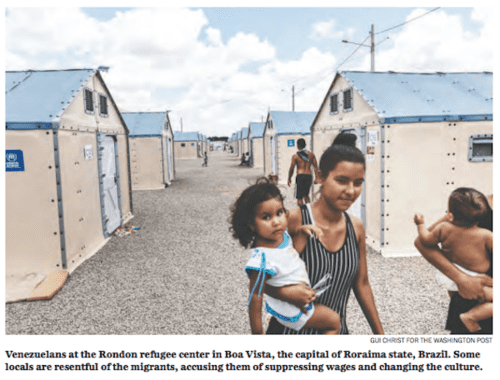
Venezuelans Fleeing Socialism Create Chaos In Brazil:"Suppressing Wages And Changing The Culture"
08/31/2018
On Friday, the Washington Post front-paged a story about the regional tumult caused by the failure of Venezuela, with the headline “Fleeing Venezuelans Transforming Region” on the paper version.
Here’s the photo included on the front page, with the caption “Venezuelans at the Rondon refugee center in Boa Vista, the capital of Roraima state, Brazil. Some locals are resentful of the migrants, accusing them of suppressing wages and changing the culture.” (Does that last part sound familiar?)

Yes, it is indeed stressful to the social fabric when many thousands of foreigners suddenly invade and impose their culture, values and cheap labor. We know that very well in America, but the Washington Post and other liberal media have been less kind to the issue of excessive immigration’s social disruption in this country.
For years, Los Angeles residents (for example) complained that they were “losing their city to people of a new culture, people they don’t know,” when liberal media characterized such remarks as racist and anti-diversity. But now the quote comes from Brazil, so it’s completely reasonable.
A Brazilian house-painter even opined, “Trump should be our president.”
Does the Post realize its hypocrisy?
Anyway, the story shows the normal human preference for an orderly community of people who share culture, values and language. Diversity is a failed ideology, right up there with communism.
The article was reprinted in the Daily Republic, a northern California paper, so click away for the whole article:
Millions of Venezuelans are fleeing to Latin American cities, By The Washington Post, August 31, 2018
BOA VISTA, Brazil — Settlers from across Brazil built this 20th-century city, creating an orderly urban space dotted with palm-fringed lawns and manicured parks. Its residents lived in relative isolation, with the most common outsiders being the anteaters wandering in from the Amazon jungle.
Then came the Venezuelans, streaming out of their country in Latin America’s largest migrant crisis in decades.
Waves of newcomers are overwhelming Boa Vista, inundating hospitals and sparking a 1,000-percent increase in emergency calls to police. Schools are scrambling to put up bilingual signs for Spanish-speaking students reaching Portuguese-speaking Brazil. Thousands of migrants are living on the streets, willing to work for a third of the wages of Brazilians. Refugee camps have sprung up in the urban core, giving rise to fears of long-term ghettos.
Boa Vista residents “are losing their city to people of a new culture, people they don’t know,” said the mayor, Teresa Surita. “If this continues, we will lose total control of this city.”
As their numbers skyrocket, Venezuelans fleeing hunger and repression in their collapsing socialist state are reshaping cities and towns across the Western Hemisphere. The sound of Caracas slang is now ubiquitous in some Miami neighborhoods. Thousands of miles to the south, the scent of Caribbean cooking wafts through streets in Santiago, Chile. In English-speaking Trinidad and Tobago, Venezuelans make up a new working class.
Aid groups estimate that between 1.6 million and 2 million Venezuelans will leave their nation this year, escaping hyperinflation and desperate shortages of food and medicine. Those numbers are on top of the 1.5 million Venezuelans who left between 2014 and 2017. Roughly 1 in 10 Venezuelans will have left their country in a four-year span.
Compared with the European nations receiving Syrian refugees in recent years, Latin American countries have few resources to cope with the deluge of migrants. In recent weeks, Peru and Ecuador started insisting that arriving Venezuelans have passports, not just national ID cards, effectively closing their borders to many.
Brazil has kept its doors open. But this week, President Michel Temer signed an emergency decree sending additional troops to the northern border to reinforce a military contingent there. The sudden migrant influx is raising concerns about crime and lawlessness, as well as deeper questions about identity in a country that was long culturally walled off by its distinctive language and habits.
As that change accelerates, initial sympathy for the migrants is turning to shock, and shock is turning to rage — bringing the global debate over immigration to perhaps its most remote outpost: the Amazon region.
“Trump should be our president,” said Marcos Pereira da Silva, 43, a house painter who joined an anti-migrant protest in Boa Vista one Saturday in mid-August. That day, hundreds of angry Brazilians in the border town of Paracaima went on a rampage, bulldozing a makeshift migrant shelter and burning its occupants’ belongings after the stabbing of a local merchant.
“We need a wall,” Pereira said. (Continues)
